#in character [takumi].
Explore tagged Tumblr posts
Text
Nana Komatsu, the fear of loneliness, and the perfect tragedy of her story
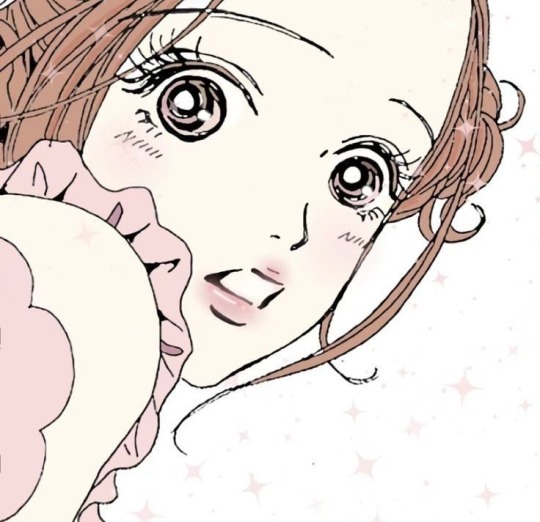
Within the Nana fandom, it is a widely acknowledged fact that Nana Komatsu ( who I will be calling Hachi for convenience) is written and portrayed as a clingy and needy character. Naturally, the effect that such a personality has on the viewers varies, with some enjoying and even empathising with Hachi, while others feel less inclined to such character archetypes, or even real life people, for a plethora of different reasons.
However, I believe that while this aspect of her personality is often highlighted, it plays a much deeper narrative role than it is given credit for. What may initially have seemed like a benign and overused personality trait — Hachi’s need for connection — actually plays a much larger role in shaping the course of her life, and understanding her relationship with loneliness and attachment allows for a greater understanding of her decisions within the anime and manga ( understanding not justification)
To do this we must examine how Ai Yazawa chooses to present Hachi to us, the viewers, in the first few episodes / chapters, and why. Hachi from the get go is depicted to be boy crazy - a girl with her head in the clouds. Someone who is quick to endear herself to others, and even quicker to idolise them - she is a character that wholeheartedly indulges in and thrives off love and attention, even if it is at the expense of her own wishes and dignity (will elaborate). We follow Hachi through her intense attachments - from her art teacher, to the pizza delivery boy, to the guy in the shop, to Asano. Out of all these attachments, we think we can see a recurring theme - they are all of romantic nature, and showcase Hachis constant search and desire to be loved. And yet there is a character whose interactions with Hachi are even more telling of Hachi’s priorities, and which I think is often undermined in the fandom due to the focus of Hachi's romantic pursuits, yet crucial to the foreshadowing and understanding of Hachi’s character and story.
Junko. We see a bond established between them right at the beginning of the anime/manga, while we're still getting to know Hachi, which serves as a key foundation for her characterisation. Hachi follows Junko to art school simply because Junko went. We observe as Hachi interacts with Junko, seeking advice,comfort and security from her, while also allowing herself to be condescended and even embarrassed by Junko. An example of this is when Junko tells Shoji and kyosuke as soon as Hachi meets them that she is loud and has a long history with men. While these traits aren't inherently negative, in the context of the society and time the manga is set in, they were not viewed as favourable traits for women. Hachi's initial protests at having these aspects of her life exposed are telling. Junko can tend at times at the start of the story to be very brisk and sometimes even outright insensitive to Hachi. Yet, when Junko decides to go to Tokyo, Hachi tearfully begs her to stay, even diminishing Kyosuke's importance to his face in an effort to keep Junko close. Realising it would be unfair to hold Junko back from her dreams, Hachi impulsively decides to apply to schools in Tokyo as well. She had no money, no set career aspirations, and no solid plans, yet was adamant to join her friend.
And this brings us to the key aspect of Hachi’s character that Ai Yazawa informed us of from very early on: she will uproot her whole life in order to not be alone. And this trait is depicted throughout all her relationships, platonic and romantic. Hachi may be boy obsessed, but to diminish her later actions to just that is a disservice to Ai Yazawa’s writing skills, as in these pivotal few scenes, Hachi’s past and future link and meld together immaculately - Hachi’s decision to stay with Takumi was foreshadowed and hinted at phenomenally from the very start of the story through Hachi’s past, and how it shaped her interactions with other characters. Her actions were rooted more in a desperate need for companionship and fear for loneliness than, as some people believe, a habit of putting her romantic relationships on a pedestal - and Ai Yazawa has reminded us of this throughout the story.
Hachi grew up in a loud and rather indifferent household where she grew up ( as a middle child) thinking that her absence would just mean less noise in the household, a thought probably encouraged by her parents' passive and impartial approach to parenting and her growing up, giving her an excess of freedom instead of the attention Hachi desired growing up. Given such an environment, she developed an anxious attachment style, clinging onto whatever relationships she has in order to avoid feeling lonely and isolated, such as her friendship with Junko. She compares the feeling to be worse than Asano breaking up with her - the moment when she realised the extent of her unrequited love and the fragility of relationships, causing her to come to terms fully with the threat of loneliness and abandonment. This concept and revelation seems to haunt her visibly throughout the first few episodes, and more insipidly years later as she still seeks companionship and intimacy to avoid the depression and fear she feels when encountering the emotion that she has correlated with feeling unwanted and used.
So given this, it makes Hachis decision to stay with Takumi even more painstakingly in line with her character. Hachi is not written to be a perfect character for readers to project their own morals into - Hachi is young, still rather sheltered and unsure of her place in the world. She thrives off others' reassurance and the security they provide her - when she feels this is being threatened ( such as when she saw Nana interact with Tsuzuki) she spirals. So when she found out she was pregnant, Takumi very intentionally divulged the information without giving Hachi a chance to prepare, recognising Hachi’s intense aversion to being alone, and exploited it in the scenario to fit his interests in keeping her by his side. Hachi was at this part of the story in a very vulnerable and insecure position. She feared and expected rejection and disappointment from her friends, a reflection of her own and society's negative and sexist feelings on her situation, and saw herself as alone. Blast was excelling and becoming increasingly busy, Junko and Kyosuke were occupied in their own daily lives, and she saw herself with nobody to turn to for help or support, and was too ashamed to ask for it from people she held in such high regard. She believed she had nobody who could give her the stability and comfort she has sought for consistently throughout the manga/anime in her friends and romantic partners.
Nobody but Takumi. Hachi knew she would not be happy. She knew that she did not love him and was not loved the way she always idealised. She knew that by marrying Takumi and raising the child with him she would be sacrificing her friends’ trust and opinions of her, and putting herself in a situation that may seem like what she always wanted ( financial stability and a family) , but was less than ideal in reality. But she ended up marrying Takumi - because she believed Takumi at the time was the only one who would accept her, who would not be any more angry and disappointed at her than she was with herself. She saw him as the only option that guaranteed the security she yearned for and seeked in every one of her personal relationships, even at the expense of her own happiness and friendships - and this because we are shown time and time again that Hachi would rather uproot her life than be on her own. She would rather suffer a person and learn to love them than be without. And that is the painstaking tragedy of it all - it makes sense for her character.
Ai Yazawa does a beautiful job at showing the very human side of personalities and relationships. Personal growth is not a linear process, and while Hachi shows moments of self-awareness and even growth, with instances where she is shown slowly blossoming into a more independent woman and recognising her self-destructive tendencies, she ultimately gravitates towards what is most familiar to her. She acts seemingly as a survival instinct, where the pale mockery of a loving relationship seems more plausible and tolerable to her than the shaky and unpredictability of her future, and facing the shock and hurt of those who she holds so dear to her heart. Though this may frustrate viewers, it is also what makes Hachi such a compelling and relatable character — her choices, while flawed, feel deeply human. Hachi doesn’t always make the smart decision, nor the one best in the long run. She is a character that displays the more uncomfortable sides of human nature and actions, and is a character that can be simultaneously loved and sighed at and learnt from, which is infinitely more educational and enjoyable than a character who has things just happen to them. She is a culmination of her past experiences and how she operated through them and processed them is translated and depicted through her relationships and actions in a realistic, though heart wrenching fashion.
#nana#nana osaki#nana komatsu#nana anime#nana and hachi#takumi#ren honjo#anime and manga#anime#anime analysis#analysis#character analysis#manga#shojo anime#shojo#nana manga#show analysis#anime gif#manga nana#manga analysis#media literacy#romance anime#nobu nana#yasu nana#reira nana#nana fanart#ai yazawa#nana hachi#hachi#hachiko
210 notes
·
View notes
Text


So uh…Last Defense Academy, huh? ❤️🖤🤍
#the hundred line last defense academy#the hundred line#last defense academy#sirei#takumi sumino#teddy's artwork#teddy's art#digital art#I NEED MORE INFO ON THIS GAME#IM SO FUCKING HYPED YOU HAVE NO IDEA#DANGANRONPA HAS BEEN MY HYPERFIX SINCE 2019#I KEEP THINKING ABOUT IT ALL THE TIME#I LOVE THE CHARACTERS#AND BC OF IT#I NOW LOVE RAINCODE WORLDS END CLUB AKUDAMA DRIVE AND TRIBE NINE#SO MANY COOL PROJECTS#THEY ARE NEVER PERFECT#BUT THEY GRAB MY ATTENTION#so yeah#I’m excited for this
177 notes
·
View notes
Text
would nana and nana’s ship name be nana 🤨
#this is so stupid please ignore me#guess who started watching nana 😔💔#NO SPOILERS PLEASE BTW#they’re so in love i hope they get married at the end of the series and ren is the maid of honor#god i love nana and hachi sm i wish lesbians were real 😢#i want to do art soon bc hachi and nana's entire wardrobe needs to be mine i WILL draw all their outfits#u can tell when the creator is a woman bc of the immaculate taste the characters have#anyway i've heard this show was devastating but im like 25 eps in and its pretty chill#hachi just started hooking up w takumi so i think things are abt to take a turn for the worse but We Will See#nana
122 notes
·
View notes
Text
how are some men capable of writing the most brain frying, cat 5 female blorbo event type characters and then proceed to utterly disrespect them on every narrative level
#jump cut to me swinging a shovel at shu takumi's face#you made her. you made the character. you can write female characters she's right fucking there because YOU MADE HER#HOW can you do her like that how in god's name can you do that to her isn't her character important to you??? her arc?? her development??#her fucking story???????#what do you mean she doesn't remember WHAT DO YOU MEANNNNNNNMN
62 notes
·
View notes
Text

They look like they’ve seen a ghost…or maybe they got caught looking like friends? “Shoot! How annoying!”
You didn’t think I’d draw an 8/6 piece without involving Takeshi somehow, did you? Happy 8/6 day! 🖤🤍
#my first full piece would be a meme piece lol#first time drawing other characters as well LETS GO#and a car!!!#the background was so much fun to draw omg#I really wanted to capture that 90’s vibe/first stage style with this#takumi being oblivious as always#takeshi nakazato#shingo shoji#takumi fujiwara#ae86#initial d#initial d fanart#night kids#my art#I’ve wanted to make a meme drawing for the longest time lol#🐇
97 notes
·
View notes
Text
What if Initial D characters had twitter? - Part 2
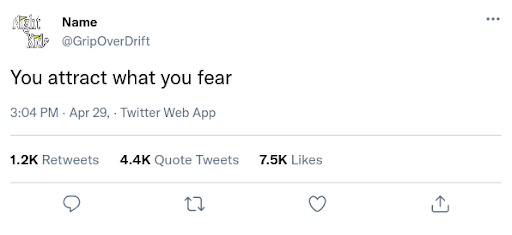


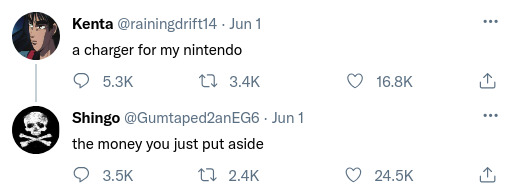


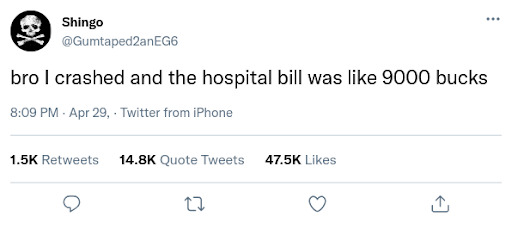
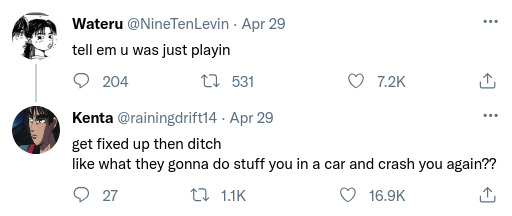
#initial d#keisuke takahashi#ryosuke takahashi#takumi fujiwara#project d#if initial d characters had twitter#hope you like the usernames those took me forever to think of#we love keisuke trying to start beef on Twitter for no reason
91 notes
·
View notes
Text

My favorite part of the gallery in AAI collections is learning that they were so stuck on design ideas for Eustace that they just designed Apollo again.
#ace attorney investigations#aai2#Eustace winner#Apollo Justice#like that is not a character that resembles Apollo#that is literally Apollo#queue takumi defense squad
34 notes
·
View notes
Text
Momose Takumi (桃瀬 匠) Character Profile
Bofurin | Zojo Unit Leader | 3rd Year
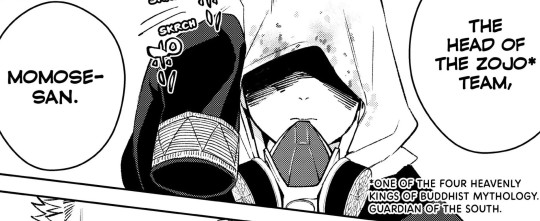
School: Furin High 3-3
Height: 150cm | Weight: 50kg | Birthday: 27 November | Constellation: Sagittarius | Blood type: A
Image colour: Tokiiro [#F3A696 - see below]
Likes: Drawing | Dislikes: Getting wet
Favourite food: Caramel | Disliked food: Myouga [Japanese ginger]
Fashion style: Stuff that feels bulky
Hobby: Going to various places to sketch
Favourite season: Spring | Favourite music genre: Vocaloid
Best subject: Art | Worst subject: English
Special skill: Drawing portraits
Dream: Wants to make a living by drawing
Recent W (or L): Was put in charge of the pictures in the pamphlets for the Market Street
Favourite place in Makochi: The school
What they always do in the morning: Maintenance of pencils

[masterlist]
#wind breaker nii satoru#wind breaker character book#momose takumi#wei translates#from the alleywei#panel chosen is the one they use in the book!
67 notes
·
View notes
Text
“BECAUSE THATS WHAT DOGGIES DO”
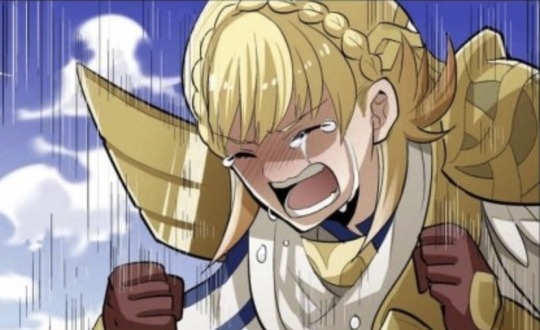

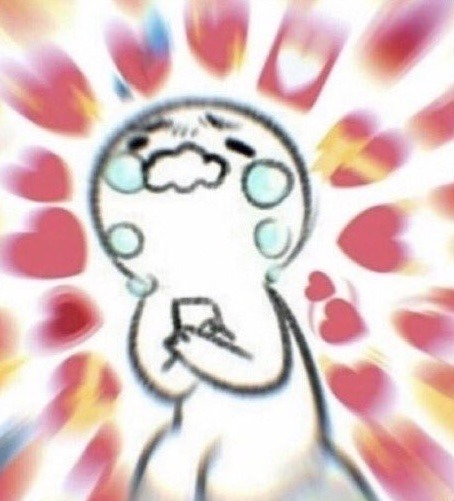
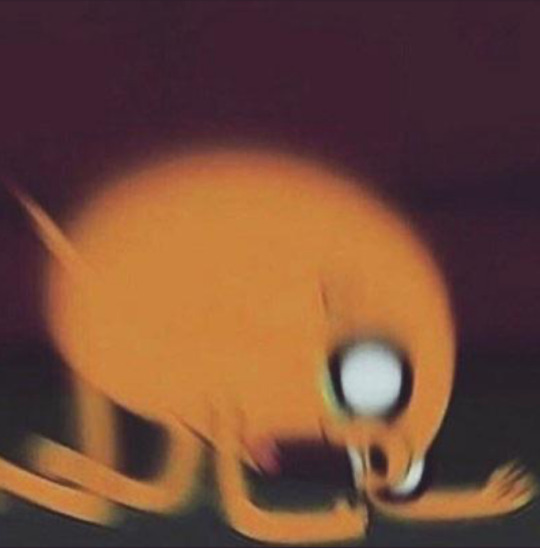





#ahem……#so anyways I beat#ghost trick#what do I do now#*loud sobbing*#you win this round shu takumi#ghost trick is actually about the world’s goodest boy ever‚ Missile#Sissle who?#Missile is the best fictional character ever#ghost trick spoilers#mine
304 notes
·
View notes
Text

Leif, Marth, Claude, Byleth, Roy, and Robin are all shorter than Soren...woah....
#i looked up heights for various characters and takumi and leo are both shorter than soren#thats wild#little soren eh...#fire emblem#fire emblem engage
129 notes
·
View notes
Text
Junko: How patriarchy, time, and perception influence ( female ) friendships:
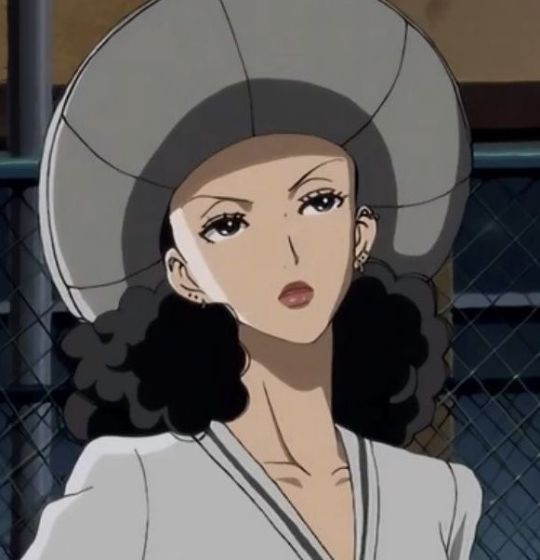
Junko is without a doubt a rather polarising figure within the Nana fandom. While some are inclined to view her as the epitome of a terrible friend, others find that there are aspects of her character that are not completely unreasonable. Some even argue that she is fully justified in her actions, interpreting them as a weary response to Nana Komatsu (Hachi’s) dependent and at times childish behaviour.
I personally find her to be an extremely intriguing case study on female friendships - it is rare to find a depiction of female friendships that deviates from the endlessly supportive, forgiving, and nurturing portrayals of female relationships. Often times women are not as forgiving and sweet to each other as is often idealised in popular media, with dynamics often being fraught with internalised misogyny, societal perceptions, past experiences, and unhealthy attachment - so it is refreshing to see such a realistic, unorthodox, and complex portrayal of relationships dynamics between women—an topic that is often underrepresented and undervalued, yet crucial in order for people of any age to reflect on their own friendships and the factors that shape their beliefs and behaviours within them.
Firstly, I think that there is no point in disputing that Junko, in her own, often unconventional way, cares about Hachi. Throughout the early episodes and chapters of Nana, Junko frequently steps in to protect and comfort Hachi when she thinks the situation calls for it. This can be seen when she immediately leaps into action when Hachi breaks down in tears, drunk and distraught over memories of Asano in Episode 2, calming her down. This concern is seen again when Junko berates Shoji for hurting Hachi’s feelings and leaving Hachi alone in an unfamiliar place before rushing out to go find her. When Junko learns that Hachi plans to move in with Nana Osaki, who was practically a stranger at the time, she tries to convince (scare) Hachi into reconsidering the decision, concerned with how Hachi would manage and what kind of person Nana would turn out to be. Accepting defeat when Hachi stayed steadfast in her decision, she challenged (Hachi’s words) Yasu, trying to support Hachi by passive aggressively asserting Hachi’s right to the apartment when Hachi failed to do so to her standards.
Infantilisation and stifling growth
However, Junko’s protectiveness often crosses the line into infantilisation, an action which is a mixture of both care for Hachi and an unconscious subscription to societal perceptions of ‘femininity’, which ends up doing more harm than good.
Ai Yazawa makes a point of emphasising that Junko has known Hachi for a long time - she is familiar with her romantic struggles and emotionally dependent tendencies. But Yazawa also shows us from the start as well that Junko is immalleable. She is a character that does not bend to displays of emotion or whims - a foil to Hachi’s very passionate and dreamy personality. It becomes apparent from their interactions that Junko, after having been around Hachi a long time, internalised how Hachi behaves and acts to the point where she sees these traits as innate to Hachi as opposed to behaviours that have developed and formed over time. This strongly held perception of Hachi becomes a problem, as instead of encouraging growth ( which is what every healthy friendship accepts and promotes), Junko reinforces these observed traits, often treating Hachi as if she were a younger sibling or even a child. She seems “relieved” when someone else is there to “take care” of Hachi and even makes decisions on her behalf, such as revealing Hachi’s crush on Shoji despite Hachi making a conscious decision to not be romantically involved in anyone, assuming that Hachi does not have the scope to actually achieve the emotional goals she sets for herself.
This dynamic consequently stifles and hinders Hachi’s ability to grow as an independent person throughout the anime, as Junko continues to see her through the lens of their shared past rather than as a peer. Even when Junko chastises Hachi for her lack of independence, she paradoxically expresses relief when someone else can ‘step in’ to care for her. This cycle of infantilisation keeps Hachi trapped in a dependent role within her friendships, and Junko’s inability to adjust her perception only reinforces these traits in Hachi. How people around you perceive and treat you influence how you subconsciously view yourself, and in Hachi’s case, she would see herself through Junko’s eyes as exasperating and hopelessly dependent. While Junko could very well believe her treatment stems from a deep and intimate understanding of Hachi, she in fact implies, most likely unintentionally, that Hachi is not capable of better. Junko's habit of infantilising Hachi repeatedly yet chastising her for the very thing Junko validates puts her in an endless pattern of being enabled, but not giving the genuine support when she does attempt to break the cycle.
Internalised misogyny and and complicity to the status quo
At the root of Junko’s behaviour there is a subtle form of internalised misogyny that permeates throughout her interactions with Hachi. Hachi’s personality is characterised by dreaminess, emotionality, and dependence, and aligns with traditionally "feminine" traits that patriarchal societies often devalue. She is romantic, frivolous and dependent, and Junko, in contrast, is portrayed to be and see herself as more pragmatic and career-oriented, which she is shown to be aware of and even proud of in the anime and manga. She firmly corrects Hachi when Hachi hopes she will give up on her dreams of art school in Tokyo, and pursues her passions and career with dedication throughout the anime. Her more modern lifestyle ( living unmarried with her boyfriend and striving for her dream career) contrast heavily with her more conservative mindset with gender - through interactions between Hachi and Junko, we can see that she seems to have adopted a more ‘masculine’ role between the two of them, acting as the voice of reason and logic, traits which are stereotypically associated with masculinity ( haha). You can see that this patriarchal compartmentalisation of personality traits is something that Junko had internalised growing up through her interactions with Hachi, perceiving Hachi as hopeless and in need due to her personality, when in actuality we find out later that Hachi is perfectly capable of making decisions herself, and managing difficulty by herself (with more resilience that others can muster). While she surely does not always make the best options, she is able to adapt and persevere - not exactly the actions of a hopelessly dependent person.
This is a greatly nuanced decision on Yazawa’s front, as she perfectly depicts how growing up in a patriarchal society does not only influence male and female relations, but all - due to Junko growing up in a patriarchal society where women with ‘feminine’ traits are simultaneously taken care of and condescended, she too mimics and appropriates such beliefs and actions. The status quo in such societies ( like Japan in the time the manga is set) are rigidly upheld yet at the same time result in the mocking and contempt of women who adhere to or fit the mould shaped and maintained by the same people who patronise them - and often times women are complicit in upholding harmful patriarchal ideals. I think this is a refreshing (and depressingly realistic) depiction of relationships between women, as it perfectly captures the delicate and painful cognitive dissonance between caring for someone and not doing what is in their best interest due to internalised misogyny.
A large aspect of internalised misogyny is putting male approval and attention on a pedestal, and Junko depicts such influences as well when she compares her love life to Hachi’s. She flaunts her alleged ability to form platonic male friendships without becoming romantically involved, ironically right before quickly entering into a relationship with Kyosuke. Junko then feels the need to justify her own quick decision of sleeping with and getting with Kyosuke to Hachi, showing a unconscious adherence to the notion that as a woman, getting with or attached to a relatively unknown man simply because of a desire to is a disdainful trait, and one that Junko makes a conscious effort to differentiate herself from - and not for Hachi. Hachi did not judge or even understand why Junko made such a fuss explaining; Junko’s attempts were more a form of self reassurance that she is not like the ‘others’ who are deemed undesirable and whorish ( a belief she holds due to her close interaction with patriarchy growing up). Junko is in fact not so different from Hachi, from what we can see from her actions in the anime and manga. We are told by her she does not attach herself romantically to men quickly, yet in the first instance possible we see otherwise. We see her look down on Hachi’s air-headed desire for a stereotypical, domestic relationship with a reliable man, while staying with Kyosuke throughout all the anime and manga, using him as a mode of support and guidance as well as a romantic and seemingly life partner. Her contempt of Hachi at times seems to be a reflection of her own insecurities with the aspects of her personality that do not fit the mould she wants - the aspects of her personality she was raised to see as less valuable and worthy and therefore grew up and internalised.
Junko’s internalised misogyny is also apparent in her loyalty to the men in her life, particularly in her defence of Shoji after he cheats on Hachi. Instead of holding Shoji accountable, Junko places the blame on Hachi, telling her that it was her fault for being too dependent, too self absorbed - too absent ( the very traits she was telling Hachi to adopt). This reaction reflects Junko’s struggle to justify her friendship with Shoji through her own internalised belief that women are responsible for men’s behaviour ( a common belief in patriarchal societies to take accountability away from men, instead vindicating and blaming the women involved). This scene serves to reveal Junko’s desire to preserve her own relationships and avoid conflict with male peers - by justifying Shoji’s actions, she maintains the comfort and security of her social circle, which includes her boyfriend Kyosuke, who is also Shoji’s best friend ( again rather similar to Hachi and her want of companionship) - she puts her male centred relationships on a pedestal at the expense of her female friendships and Hachi’s wellbeing.
Junko’s character serves as a window into the nuanced ways internalised misogyny, perception, and shared history can influence female friendships. Her dynamic with Hachi is shaped by her rigid perception of Hachi’s weaknesses and her own internalised biases about what traits are "acceptable" in women. While Junko is portrayed as a capable, independent woman—someone Hachi and other women can in some ways even looks up to—her patronising attitude ultimately undermines the potential of their relationship. Junko’s failure to see Hachi as an evolving, autonomous person perpetuates a cycle of dependence, preventing both women from growing as individuals and as friends, with Junko feeling equally responsible and burdened by Hachi but not allowing the relationship to develop beyond how it was in the past.
By portraying Junko, one of Hachi’s closest friends, as such a complex, multidimensional character, Ai Yazawa offers a compelling critique of the ways in which societal norms and internalised beliefs can distort relationships between women, and bring attention to topic that is often neglected yet experienced and lived by women universally. Junko’s story illustrates that it is not only overt sexism that influences women’s lives but also the more subtle, internalised forms of misogyny that shape how women perceive themselves and each other, and the pitfalls of relationships that remain stagnant in the past instead of allowing both parties to grow and flourish.
#nana osaki#manga nana#nana komatsu#nana anime#nana#nana and hachi#anime analysis#anime#anime and manga#manga analysis#manga#nana manga#nana hachi#hachi#hachiko#ai yazawa#ren honjo#takumi#junko saotome#media analysis#media literacy#character analysis#anime gif
185 notes
·
View notes
Text




It’s the Main Guy ❤️⚔️
#the hundred line last defense academy#the hundred line#last defense academy#takumi sumino#teddy's artwork#teddy's art#digital art#sirei#HUNDRED LINE TWITTER#DROP THE OTHER CHARACTER PROFILES#AND MY LIFE#IS YOURSSSS#I wanna draw everyone elseeeee#I’m so excited for this game y’all don’t KNOW#this game is definitely out of my wheel house#like genre wise#but I’m willing to give it a shot#for these silly guys#I’ll try#also good morning
52 notes
·
View notes
Text
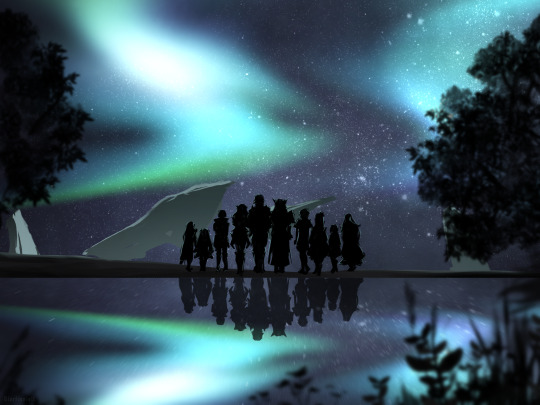
[A last minute] Day 7 of Fates week: revelation (ft. faintly, Corrin, Elise, Leo, Camilla, Xander, Ryoma, Hinoka, Takumi, Sakura and Azura)
I’m sorry, Leo. You’ve been in three different entries—but only the back of your head.
#fire emblem fates#fire emblem#digital art#xander fire emblem#camilla fire emblem#leo fire emblem#elise fire emblem#art#ryoma fire emblem#hinoka fire emblem#takumi fire emblem#sakura fire emblem#corrin fire emblem#azura fire emblem#a lot of character tags for the back of their heads
107 notes
·
View notes
Text
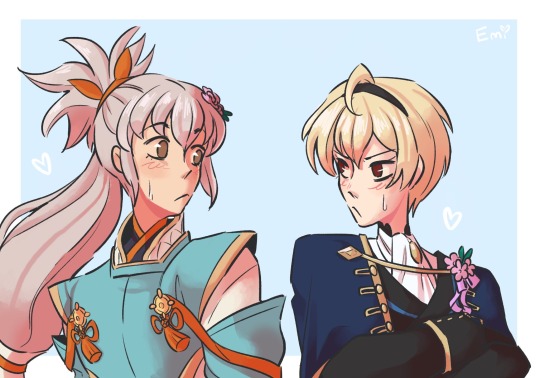
When your little sister drags you to the Day of Devotion festival and leaves you with the youngest prince of the enemy kingdom 👀
#fire emblem#fire emblem heroes#fire emblem fates#fire emblem leo#fire emblem takumi#takuleo#leokumi#yea they’re gay keep scrolling#The two first fe characters I fell in love with 🙏#fates isn’t my absolute fav fe anymore but every now and then I think abt all the royals I love them all very much#I literally popped tf off when this banner was revealed
510 notes
·
View notes
Text
cabanela ghost trick is the character of all time. he's flamboyant he rides a shitty little bike to work he has to serve cunt whenever he enters a room he calls people baby regardless of gender he has homoerotic tension with his best friend he has a stupid speech quirk he has beef with a cat he has old man swag and his idle pose is him standing around like that one jerma picture. what more could you possibly want
#grae text#ghost trick#like he is such a shu takumi character but at the same time he is special to me#gt spoilers#(implied)
547 notes
·
View notes
Text
What if Initial D characters had twitter?
just some fake posts on what I imagine it would be like if the initial d characters had twitter!
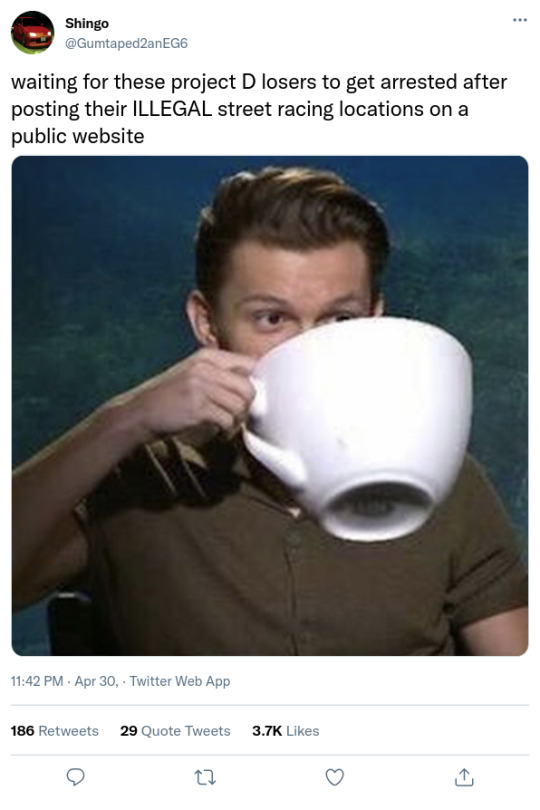
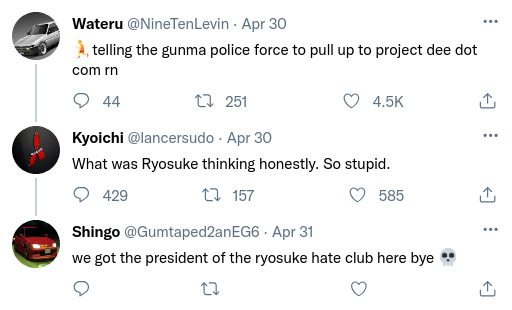
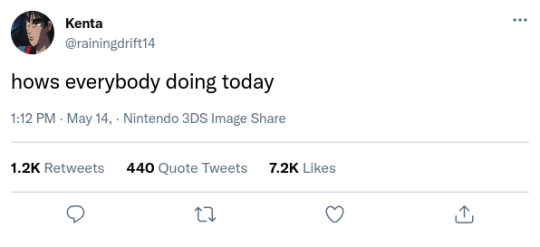
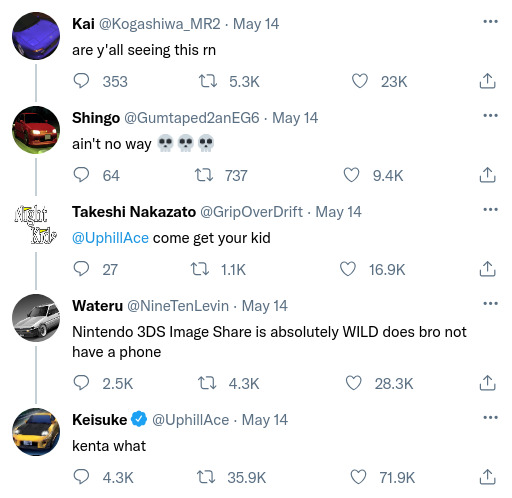
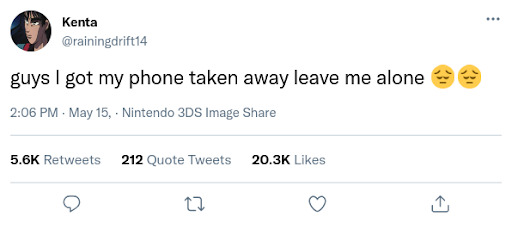
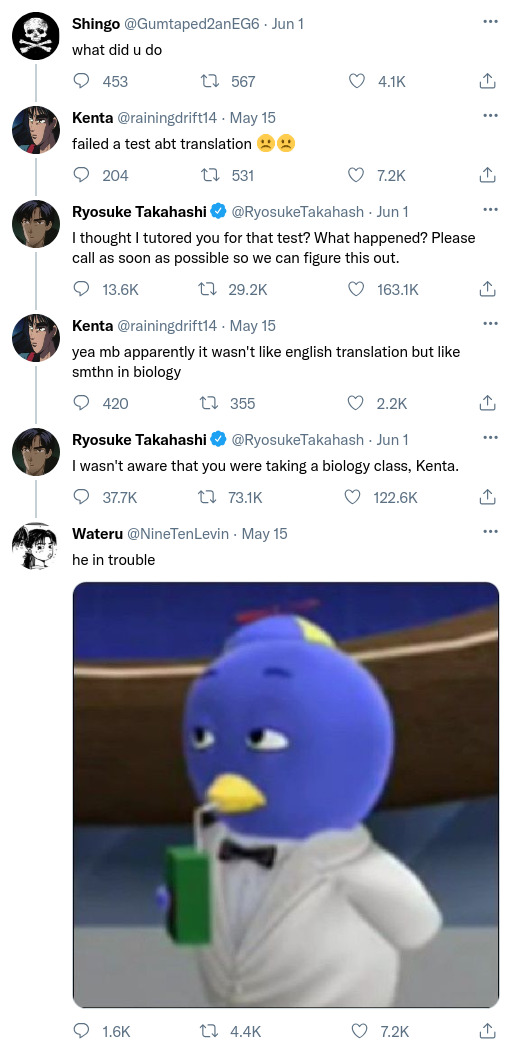

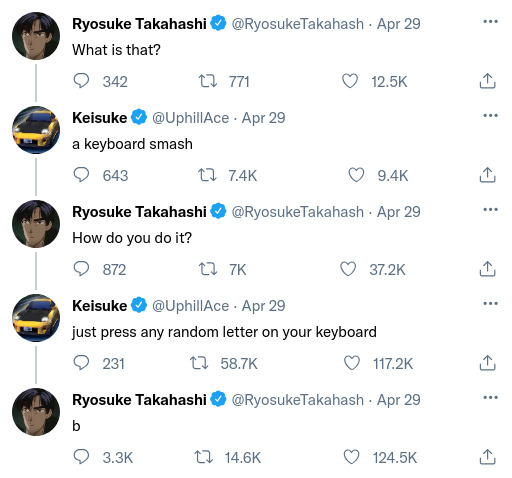
#initial d#keisuke takahashi#ryosuke takahashi#takumi fujiwara#project d#if initial d characters have twitter#kenta on that Nintendo 3ds image share#we love ryosuke and keisuke being the only verified ones lol
56 notes
·
View notes